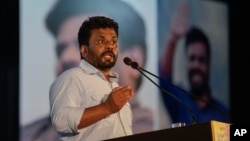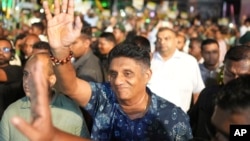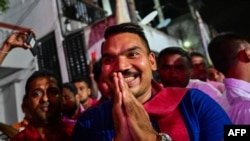Two years after massive popular protests in Sri Lanka ousted former president Gotabaya Rajapaksa at the height of a crushing economic downturn, millions in the island nation will head to the polls Saturday to choose a new president.
The rallying cry at the protest movement, called “aragalaya,” or struggle, was for an overhaul of the political establishment that many perceived as corrupt. That anger, which continues to fester, along with economic hardship that millions suffer will influence the vote, according to political analysts.
“They want a change of the system. That means that they don’t want the old ways where there was no transparency, no accountability,” Paikiasothy Saravanamuttu, executive director of the Center for Policy Alternatives in Colombo told VOA. “They want an alleviation of the economic hardship they are suffering.”
As they seek to usher in change, the island nation’s 17 million voters will choose among three main contenders. President Ranil Wickremesinghe, who was elected by Parliament to the top post after Rajapaksa’s exit, is running as an independent candidate. His main challengers are opposition leader Sajith Premadasa and the leader of a Marxist-led alliance, Anura Kumara Dissanayake.
Wickremesinghe is wooing voters with the promise of building on the country’s fragile economic recovery that he has steered. He secured a nearly $3 billion International Monetary Fund bailout, which pulled Sri Lanka back from the brink of bankruptcy, eased severe shortages of food and fuel and lowered runaway inflation.
“Like the Titanic, Sri Lanka could have sunk,” Wickremesinghe told a rally. “There was no captain. I took responsibility for the ship.”
Political analysts say he is attracting the support of people who respect him for restoring stability. “There are those who believe that he has gone to the IMF, he has got a deal with them and that we should continue with him to get out of the terrible mess that we got ourselves in and then start to rebuild again.” Saravanamuttu said.
However, people still cope with massive economic woes. Wickremesinghe slashed subsidies and imposed higher taxes as part of IMF austerity measures, which are hurting millions. Living costs have surged while incomes have stagnated. At least a quarter of the country’s 20 million people are reeling under poverty.
Some also see Wickremesinghe as a part of the “old political guard” which protesters sought to overthrow. He has been accused of protecting the Rajapaksa political family and shielding them from prosecution. Tough measures he took to curb protests, including drafting new security laws, angered many.
“I am voting for systematic change, not just a change of faces or end of the political elite that have run this country to the ground,” said Marisa De Silva, an activist in Colombo who took part in the 2022 protests. “We are proposing socialist policy changes for real change.”
That deep discontent has catapulted left-wing leader Dissanayake, popularly known as AKD, from the margins to the center stage of the political race. A fiery orator, his rallies have attracted huge crowds as he taps into the anger among many voters. He has vowed to work toward ensuring that the rich pay more taxes under the IMF restructuring plan. There are no reliable polls, but he is seen as a frontrunner in the race.
The National People’s Power alliance he heads is made up of different groups that include political parties, youth, civil society, women’s groups and trade unions. It is centered on the working class.
“They have never really been in power themselves, so they are presenting themselves as the party that can come in and sweep out the old guys, particularly corruption which is a big problem in Sri Lanka and which many blame for the current crisis,” Alan Keenan, a senior consultant on Sri Lanka at the International Crisis Group, told VOA, “So he is seen as the big change agent,” he added.
Opposition leader Premadasa, who also pledges to ease the burden on ordinary citizens, is also a strong contender. He wants to steer a middle path between the status quo and the radical change that Dissanayake wants to usher in.
Another candidate is Namal Rajapaksa, the nephew of Gotabaya Rajapaksa, who was president when protesters stormed the presidential palace in 2022 after the economy collapsed. His father, Mahinda Rajapaksa, was also a former president. The Rajapaksas are widely blamed for the country’s financial mismanagement. Although Namal Rajapaksa is not a serious contender for power, his candidacy is a bid by the once-powerful political dynasty to win back their base, according to analysts.
A significant number of uncommitted voters has made it hard to forecast the election.
“The question is do voters want a radical change with someone who is untested, do they want to stick with the current program, which is painful but perhaps might lead somewhere eventually, or do they go want to go with someone who is critical of the current approach but not quite as radical as Dissanayake?” asked Keenan.





